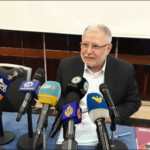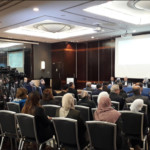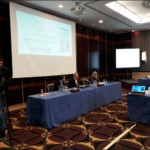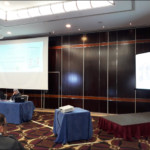In a press conference held, on 9/1/2018, al-Zayotuna Centre announced the major conclusions of the Palestine Strategic Report 2016–2017 (PSR 2016–2017) with projections to 2019.
The Report’s editor and al-Zayotuna’s General-Manager Prof. Dr. Mohsen Mohammad Saleh announced these conclusions, by introducing the report as the tenth volume of the PSR series, which started to be published in 2005. The 400-page report is a comprehensive, objective and academic report prepared by 14 experts and specialists in the Palestinian issue. It presents scientific material in an objective and analytical framework, while seeking to foresee future developments in the internal Palestinian situation, Palestinian demographic and economic indicators, and the Land and holy sites. It discusses the Israeli scene and its demographic, economic and military indicators, in addition to resistance operations and the peace process. It also focuses on the Arab, Islamic, and International stances towards the Palestinian issue.
As for the peace process, Saleh pointed out that it has reached a dead end, and that’s it’s going to collapse, for the Oslo Accords have proven their inability to present genuine political solutions. As long as the rules of the game are the same, he added, the two-state solution, from a Palestinian point of view, will actually collapse. The prospects are slim for a real change in the Palestinian Authority (PA)’s role as a tool that serves Israeli objectives rather than the goals and aspirations of the Palestinian people. Consequently, there must be a deep review of the peace process and the PA’s structure in order to attain the highest interests of the Palestinian people.
The PSR 2016–2017 concludes that during the last two years, and despite the convening of multiple meetings convened, Egypt’s mediation, and Hamas agreement to hand over administrative control of Gaza Strip (GS), Palestinian reconciliation has failed to make any tangible progress. If parties to the schism keep dealing with the reconciliation in the same way, and if the official Palestinian leadership does not seek a real partnership on a basis that reflects the real weight of Palestinian powers at home and abroad, and if the reconciliation continues to lack the foundations of a real national project, based on Palestinian fundamentals, the reconciliation will never be achieved. The report recommends that the focus must be on tracks that are neither controlled by the Americans nor the Israelis, for the tracks of PA government formation, the elections in the West Bank (WB) and GS, and the reform of government’s organs and institutions (especially those in WB), are easily disrupted and thwarted by Israel. This means that the reconciliation parties must seek to rebuild and reactivate the Palestine Liberation Organization (PLO), free from foreign influence. Also, seeing how the peace process has failed, there is a better chance for putting the Palestinian political house in order.
PSR 2016–2017 indicates that with the beginning of 2018, the Palestinian population worldwide is estimated at 13 million, more than half of whom (6.59 million or 50.6%) live inside Palestine and the rest reside abroad, noting that three quarters of them live in Jordan and other neighboring countries. Palestinian refugees remain the largest refugee population in the world compared to their total population, amounting to 67%, where 2.16 million refugees, who live in the WB and GS, descend from the territories occupied in 1948.
This year, the Palestinian population in historic Palestine will exceed the Jewish population, while in 2022, they are expected to exceed them by 300 thousand more. Such Israeli concerns may push the authorities to intensify their racist and aggressive measures. Therefore, all efforts must be made to support the steadfastness of the Palestinians on their land.
Due to the Oslo Accords and the Paris Protocols and their related entitlements, the Palestinian economy will continue to suffer in the WB and GS, which are under occupation and siege. Israel still controls the PA’s exports and imports (61.9% of PA’s trade); 83.2% of its exports and 58.2% of its imports. The Israeli Gross Domestic Product (GDP) is 24-fold more than its Palestinian counterpart. In 2017, Palestinian GDP per capita in PA territories reached three thousand dollars compared to a $40 thousand for Israeli GDP. Palestinian budget depends largely on foreign aid and on tax revenues collected by Israel, which add up to 71% of total revenues, consequently the PA is controlled by these two.
The report discussed in detail the Israeli aggression against the Palestinian people, and the Palestinian resistance and Intifadah. The Israel Security Agency—ISA (Shabak) reported that in 2016, there were 1,415 attacks, and in the first eleven months of 2017, there were 1,267 attacks.
134 and 94 Palestinians were killed, in 2016 and 2017 respectively. In Israeli prisons, there are still 6,200 prisoners, including 311 child and 453 administrative detainees.
PSR 2016–2017 detailed the sufferings of Jerusalem and the holy Islamic and Christian sites from the Israeli occupation. 2017 has witnessed more judaization and settlement building programs, more excavations under and around al-Aqsa Mosque, more storming of al-Aqsa Mosque, and more than 900 attacks on al-Aqsa Mosque and the worshippers there. In the report, it was noted that during the whole last period, the Jerusalemites were steadfast, especially during the Lion’s Gate uprising (Bab al-Asbat).
As for settlement building and confiscation of land in the WB, the report indicated that 90 Jewish settlements were expanded. In 2017, the number of Jewish settlers exceeded 800 thousands in the WB, where there are 196 settlements and 230 outposts.
The PSR 2016–2017 presented the latest developments concerning the Separation Wall in WB, and Israel’s demolition of Palestinian buildings and houses, The report warned that Israel will try to gain as much as it can and to established facts on the ground, in the midst of a fragile and weak Arab and Islamic environment. However, Palestinian resistance is expected to continue, and its chances will increase as the peace process faces a dead end.
The report includes a chapter on the Israeli internal, demographic, economic and military scene. It warned against the rising religious and right wing extremism in Israel, while the left-wing movements are in significant decline. The Israeli government is advocating for the “Jewish Identity” in a racist manner and based on religious, national and cultural backgrounds. In 2018, the Jewish population in Israel reached 6.56 million, i.e., 45.5% of world Jewish population (14.41 million), whereas immigration reached a stable rate (25 thousand annually), nearly equal in number to those emigrating from Israel.
Despite Israeli economic progress, GDP increase, GDP per capita increase (around $40 thousand annually) that is equivalent to some European countries, the Israeli qualitative huge military force, and the fragile and weak Arab and Islamic environment; Israel will continue to face many crises. The Palestinians remain steadfast in their homeland with their continuous resistance, in the midst of an Arab public environment that refuses dealing with Israel, and in the midst of an unstable strategic regional environment with a growing anti-Israel sentiment.
PSR 2016–2017 expects that the Arab countries, mainly Egypt and Jordan, will maintain their official relations with Israel, which will try to make a breakthrough in its ties with some Gulf countries, on the basis of an anti-Iran anti-“terrorism” alliance. However, such aspirations will not be easy to achieve. Some Arab countries would prefer an under-the-table relationship because of the widespread anti-normalization sentiments.
The stance of League of Arab States toward Palestine is not expected to improve in the near future, whereas Turkey under Erdoğan would maintain its active pro-Palestine position. At the same time, it would keep its cold relations with Israel, while enjoying an active trade. As for Iran, its political and military support for Palestinian resistance would continue, and so would its open hostility towards Israel.
The chapter of the Palestinian Issue and the International Situation has pointed to the international support for the Palestinians (around 140 countries) in the United Nations General Assembly and other international organizations. However, the United States and other major countries dominating the Security Council and international politics would not coerce Israel to take any step it refuses. The chapter concluded that the United States has lost its credibility as a mediator for the peace process, especially after President Trump’s decision to move the American embassy to Jerusalem from Tel Aviv.
The report pointed that Israel is increasingly concerned with the slight increase in the negative views of Israel’s influence in the world, and the high prospects for more international success for the BDS movement.
Al-Zaytouna Centre shall post the Executive Summary on its website, while the whole report will soon be published.








Leave A Comment